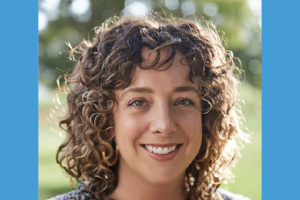Democracy and Public Discourse: Shannon McGregor takes part in UNC faculty discussion

By Beth Hatcher
UNC Hussman School of Journalism and Media Assistant Professor Shannon McGregor joined an interdisciplinary UNC faculty panel for the discussion “Democracy and Public Discourse,” hosted by UNC’s Program for Public Discourse on Sept. 14.
McGregor’s research addresses the role of social media and their data in political processes with a focus on political communication, journalism, public opinion and gender. She is a senior researcher at the collaborative UNC Center for Information, Technology, and Public Life.
McGregor joined history professor Claude Clegg, psychology and neuroscience associate professor Kurt Gray and political science professor Marc Hetherington in the virtual and in-person discussion, hosted by history associate professor Molly Worthen, and co-sponsored by Carolina Public Humanities and the General Alumni Association.
The talk probed whether contentious public political discourse was inevitable in the political arena or signaled a failing democracy, with panelists examining topics ranging from the importance of social belonging in creating personal beliefs, to the effect of social media’s increasing ubiquity in public discourse.
Worthen started off the conversation by asking if public discourse was broken and if so, why?
“I think [public discourse] has a pretty severe sprain,” McGregor said, noting the erosion of democratic norms as a cause. McGregor said the current climate of public discourse made her ask questions like: “Does the marketplace of ideas still work? Is freedom of expression out of balance with other democratic freedoms?”
Hetherington agreed that public discourse had become more contentious, noting that many of today's divisive issues — such as class or race —are identity-based and therefore make compromise harder.
Gray noted that a dehumanization of people with opposing viewpoints, as well as a linking of morality with political views, worsened public discourse, while Clegg, taking a historical perspective, said that public discourse wasn’t necessarily worse now than in the past, maybe just more unfiltered. People in the 1960s didn’t have Twitter.
“Public discourse is going to be sloppy; it’s going to have rough edges — that’s the price you pay in a democratic society,” Clegg said.
The event’s discussion topics also included the role of society’s leaders and the news media in creating polarization — sensationalism from those groups never helps.
However, panelists also noted that opposing viewpoints and their battles often create the ideas propelling democracies forward.
“What scholars are increasingly concerned with is what we call affective polarization, a particular animus towards people you see differently than you,” McGregor said. “Polarization in and of itself is not inherently a bad thing.”
Helping people understand the personal experiences of others combats polarization, panelists agreed, with McGregor noting the news media’s important role in telling stories that center around personal experiences, as well as stories highlighting the institutional and societal structures creating those personal experiences.
Another large segment of the discussion centered around combating society’s distrust of the opinions of elites and experts in public discourse. Clegg said that institutions like UNC and its experts could do a better job of helping the general public understand how the institution’s work affects their lives.
McGregor noted the power of leaders bringing their “authentic selves” to positions of power. Experts and elites can look like anyone now, maybe not the case for much of the country’s history — and that diversity extends beyond race or gender. For example, McGregor doesn’t think she should have to give up her millennial speech patterns just to be taken seriously.
“I don’t need to sound like someone else to be authoritative, to claim the knowledge that I have worked quite hard to build,” McGregor said.
"Tuesday’s panel discussion did a great job demonstrating the multidimensionality of democracy and public discourse," said Kevin Marinelli, executive director of the Program for Public Discourse. "People share a common concern for these issues, but a common concern does not necessarily entail a single solution. Having such a diverse panel helped illuminate the various perspectives available to critique and engage these issues."
A recording of the panel discussion will be made available on the Program for Public Discourse’s YouTube channel.